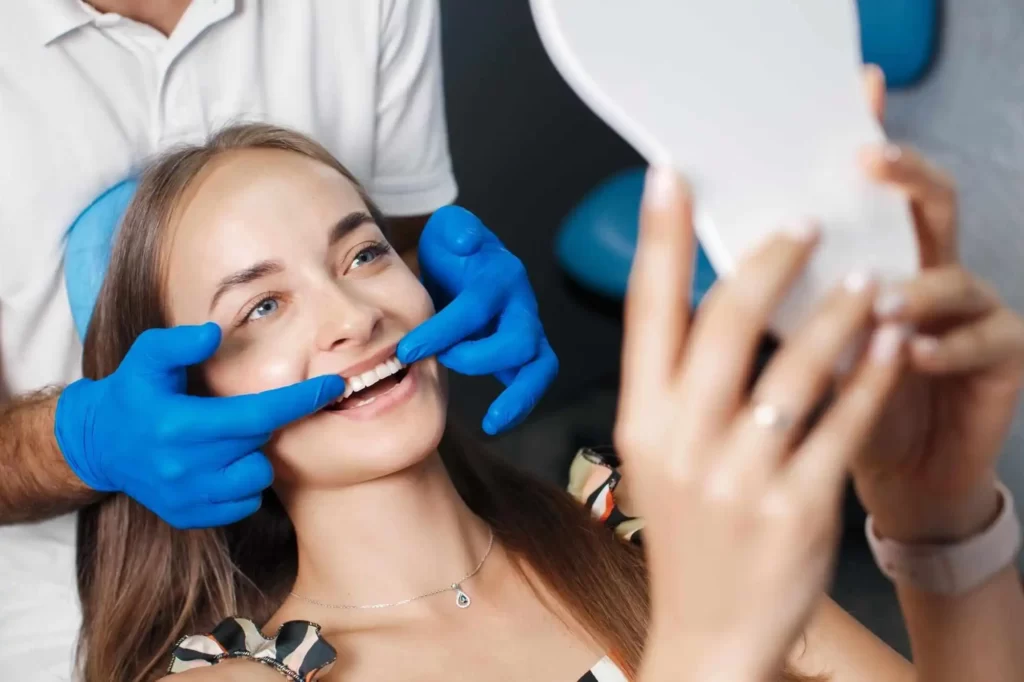Are you among the numerous individuals who want teeth scaling and polishing to give them a whiter, more radiant smile? This article will serve as the revolutionary process and assist you in understanding the dos and don’ts. Learn more about Do’s and Dont’s after Teeth Scaling and Polishing.
Quick Facts:
Risks: None
Cost: 250 SAR to 350 SAR
type of treatment: NonInvasive
Results: Long-lasting
Teeth scaling and polishing:
One dental operation that is essential to getting a healthier, more attractive smile is teeth scaling and polishing. It involves the two separate yet connected processes of polishing and scaling.
Scaling: The initial phase in the procedure involves eliminating tenacious, accumulated deposits from your teeth. The main materials found in these deposits are plaque and tartar. Tartar and plaque are the adversaries of a brilliant smile, in case you are unfamiliar with these dental monsters.
Polishing: The next step is to give your teeth a thorough scaling and polishing. Making your teeth feel and look their finest is the main goal. Your teeth may have some rough areas or surface stains that need to be cleaned up after scaling.
To remove surface stains and defects, your dentist will use a specific polishing instrument and a somewhat abrasive paste. Your teeth seem glossy and smooth after this procedure—almost like they have a new beginning. Your teeth seem to be receiving a revitalizing spa treatment, and the outcomes are remarkable. The way your teeth look and how confident you feel about your smile will change right away.

Do’s and dont’s after Teeth Scaling and Polishing:
Do’s
Sustain Exceptional Dental Hygiene
Maintaining your dental hygiene is more important than ever after scaling and polishing. Using fluoride toothpaste and a toothbrush with soft bristles, brush your teeth at least twice a day. Flossing is just as crucial for clearing plaque and debris from between your teeth.
Adhere to a Well-Rounded Diet:
The condition of your teeth is greatly influenced by your diet. Obtain your nutrition from a variety of foods, especially those high in calcium, vitamin D, and phosphorus. These elements are essential for healthy teeth.
Sip a Lot of Water:
For keeping your teeth healthy, water is your best friend. It keeps your mouth moist and helps remove food particles, both of which can cause dry mouth and poor breath.
Don’t’s
Avert Staining Agents:
Avoid staining materials such as red wine, tea, coffee, and tobacco in the days right after your treatment. The effects of your scaling and polishing can be reversed by these.
Refuse Sticky or Hard Foods:
Foods that are hard and sticky can harm your dental work and enamel. Steer clear of things like sticky toffees, popcorn kernels, and hard sweets.
Abstain from Carbonated and Alcoholic Drinks:
These beverages may exacerbate enamel degradation. Choose water or other non-sugary, non-acidic beverages instead.
Book us Now!
Don’t delay any further book an appointment with us right away. When you’re ready to take the next step, we strongly recommend arranging a consultation with our dedicated and knowledgeable team. Feel free to reach out to us if you require any additional information about Do’s and Dont’s after Teeth Scaling and Polishing.
FAQ’s
Do they hurt?
No, the process is usually not uncomfortable. Most folks barely feel any discomfort at all. Although it’s a non-invasive procedure, your dentist could apply a local anesthetic to make you more comfortable.
How much time does it take?
The amount of tartar and stains will determine how long the process takes. It takes between thirty and sixty minutes on average. A more precise estimate will be given.
is there any downtime?
There isn’t any prolonged downtime. Following the operation, you can immediately get back to your regular activities. For optimal outcomes, it is recommended to adhere to certain instructions.
Do they have any adverse effects?
Mild sensitivity is the most frequent side effect, and it usually goes away in a few days. It is uncommon to encounter any serious adverse effects.
How frequently should I get it done?
From person to person, the frequency of scaling and polishing may differ. To preserve the best possible dental health, it is generally advised to have this operation every six months.










